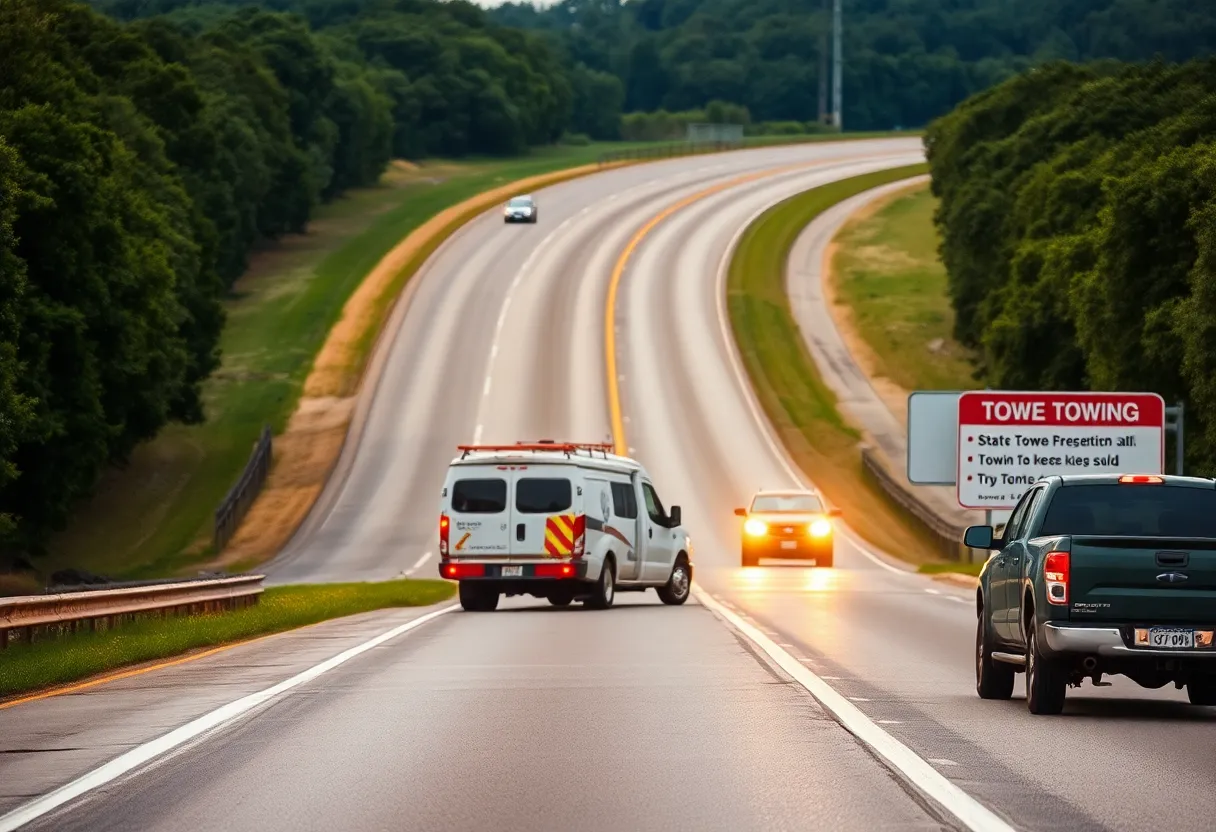Orlando Florida, August 28, 2025
News Summary
In Florida, towing companies are prohibited from approaching crash scenes without being requested by the vehicle owner or directed by law enforcement. This law aims to protect victims from predatory practices known as ‘wreck-chasing’. Towing must be initiated by either the vehicle owner or law enforcement, thereby ensuring accountability and fair pricing through official rotation lists of licensed companies. Drivers are not required to accept services from unsolicited tow trucks and can wait for an authorized tow. The law operates under Florida Statute 713.78 and related crash procedures.
Orlando
Unsolicited tow trucks at crash scenes are illegal in Florida
What happened: In Florida, tow trucks may not lawfully approach or provide towing services at the scene of a traffic crash unless the vehicle owner requests the service or law enforcement directs the tow. This restriction is intended to prevent unsolicited solicitations commonly known as wreck-chasing and to protect crash victims from predatory towing and related delays.
Key facts
- Florida statutes and crash procedures requiring lawful towing are set out in Florida Statute 713.78 and the traffic crash procedures in 316.061.
- Unauthorized tow operators are prohibited from soliciting business at crash scenes; this practice is commonly called wreck-chasing.
- The law aims to guard drivers against confusion, interference with emergency response, and predatory practices such as excessive storage fees or towing to distant facilities.
- Law enforcement agencies maintain an official rotation list of licensed tow companies to ensure accountability and fair pricing; companies on that list undergo annual inspections.
- If an unsolicited tow truck arrives at a crash scene, drivers are not obligated to accept the service and may decline the tow.
How the law works and why it exists
The legal framework requires that tows from crash scenes be initiated by either the vehicle owner or a law enforcement officer. This means that when a tow truck shows up without being requested by one of those parties, the driver involved in the crash may refuse the service. The rules are enforced through state statute and through standardized traffic crash procedures to limit improper solicitations.
The stated goals of these rules are threefold: reduce confusion for people involved in crashes, prevent interference with emergency responders, and limit opportunities for predatory towing practices. Predatory behaviors noted in enforcement contexts include excessive storage or administrative fees, towing vehicles to distant or inconvenient locations, and creating obstacles for timely retrieval of vehicles.
Official rotation lists and oversight
To increase transparency and fairness, law enforcement agencies use an official rotation list that names licensed tow companies authorized to respond to crash scenes when an officer requests a tow. Being on this rotation list is tied to oversight: tow companies listed by agencies typically undergo annual inspections to confirm compliance with equipment, licensing and pricing rules.
What drivers should know and do at a crash scene
Drivers involved in a crash should be aware that unsolicited tow operators at the scene do not have an automatic right to tow their vehicle. A vehicle owner who prefers a particular company can request that company directly, and law enforcement may direct a company from its rotation list to remove vehicles for safety or traffic flow reasons. If a tow truck arrives without invitation, the vehicle owner may refuse service and wait for a law enforcement-directed tow or arrange their own legally authorized tow.
Enforcement and consumer protection
Enforcement of the no-solicitation rule seeks to protect consumers from unexpected charges and inconvenient or deceptive towing practices. The combination of statute, crash procedures and rotation lists is used to provide clear channels for lawful towing and to make accountability and pricing more uniform. Annual inspections of listed tow companies support regulatory compliance and oversight.
Bottom line
Unsolicited tow trucks at crash scenes are illegal in Florida unless specifically requested by the vehicle owner or ordered by law enforcement. Drivers are not required to accept service from an unsolicited wrecker, and law enforcement maintains systems to manage authorized towing and guard against predatory practices.
Frequently Asked Questions
Can a tow truck show up at my crash scene without being called?
No. In Florida, tow trucks may not legally solicit business at a crash scene unless requested by the vehicle owner or ordered by law enforcement.
What is wreck-chasing?
Wreck-chasing refers to unsolicited tow operators approaching crash scenes to solicit business. This practice is prohibited under Florida law to protect crash victims and emergency response efforts.
What protections exist against predatory towing?
Protections include statutory prohibitions on solicitation at scenes, the use of law enforcement rotation lists of licensed tow companies, and annual inspections of companies on those lists to help ensure fair pricing and compliance.
Am I required to accept a tow from an unsolicited truck?
No. If an unsolicited tow truck arrives, you are not obligated to use that service and may decline. You may request a tow from your preferred company or wait for a law enforcement-directed tow.
Which laws govern towing at crash scenes in Florida?
Towing procedures at crash scenes are governed by Florida Statute 713.78 and traffic crash procedures under 316.061.
Simple chart: Key features of Florida crash-scene towing rules
| Feature | Status/Notes | Enforcement level |
|---|---|---|
| Unsolicited solicitation (wreck-chasing) | Prohibited at crash scenes | High |
| Who can request a tow | Vehicle owner or law enforcement only | High |
| Legal references | Florida Statute 713.78 and 316.061 procedures | Statutory |
| Rotation list oversight | Maintained by law enforcement; annual inspections | Moderate to High |
| Predatory towing risks | Includes excessive fees, distant towing | Guarded against |
Deeper Dive: News & Info About This Topic
HERE Resources
Additional Resources
- My News 13: Orange County Leaders Share Tips on Back to School Traffic Safety
- Click Orlando: Traffic Lights Can Take a Long Time to Change in Florida
- Fox 35 Orlando: Rep. Soto Pushing Upgrade Air Traffic Control Systems Orlando International Airport
- WESH: Road Safety Spring Break Travel in Florida
- Florida Phoenix: Pulse Memorial Rainbow Crosswalk in Orlando Removed Overnight
- Wikipedia: Traffic Safety
- Google Search: Traffic Safety Florida
- Google Scholar: Traffic Safety Florida
- Encyclopedia Britannica: Traffic Safety
- Google News: Florida Traffic Safety

Author: STAFF HERE ORLANDO WRITER
ORLANDO STAFF WRITER The ORLANDO STAFF WRITER represents the experienced team at HEREOrlando.com, your go-to source for actionable local news and information in Orlando, Orange County, and beyond. Specializing in "news you can use," we cover essential topics like product reviews for personal and business needs, local business directories, politics, real estate trends, neighborhood insights, and state news affecting the area—with deep expertise drawn from years of dedicated reporting and strong community input, including local press releases and business updates. We deliver top reporting on high-value events such as Orlando International Fringe Theatre Festival, Megacon Orlando, and Central Florida Fair. Our coverage extends to key organizations like the Orlando Economic Partnership and Hispanic Chamber of Commerce Metro Orlando, plus leading businesses in leisure and hospitality that power the local economy such as Walt Disney World Resort, AdventHealth, and Universal Orlando. As part of the broader HERE network, including HEREJacksonville.com, HEREPetersburg.com, HERETallahassee.com, and HERETampa.com, we provide comprehensive, credible insights into Florida's dynamic landscape.




